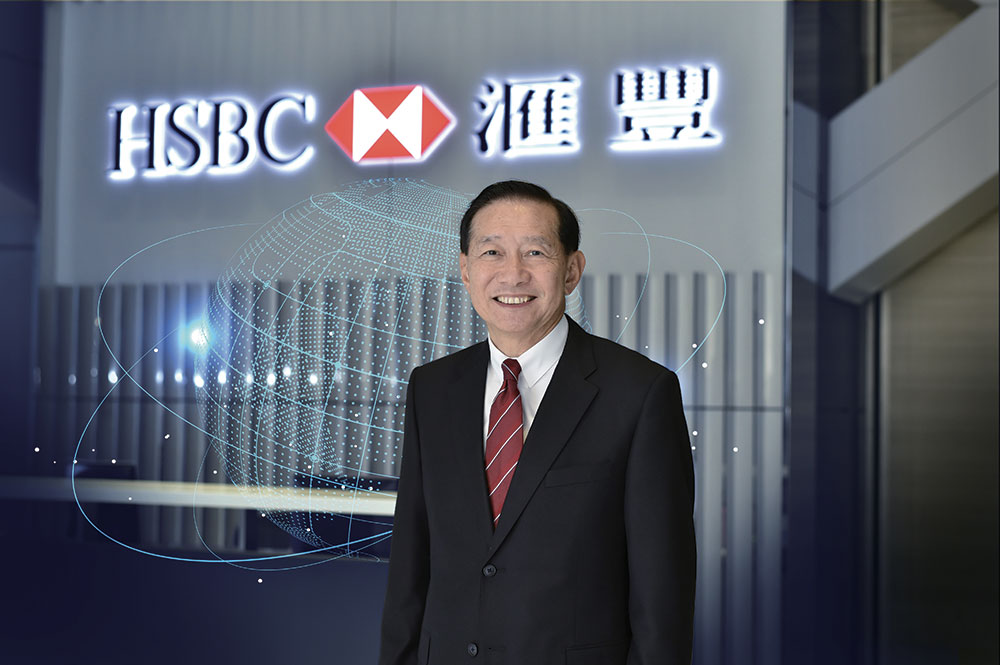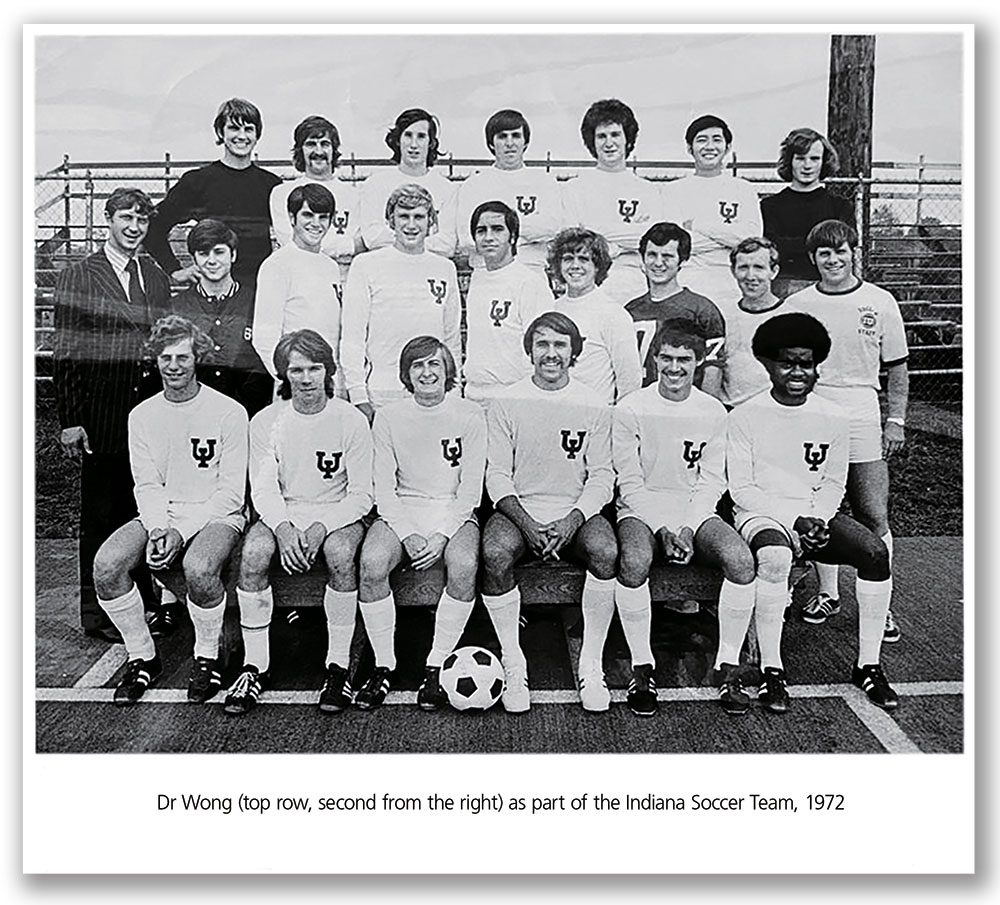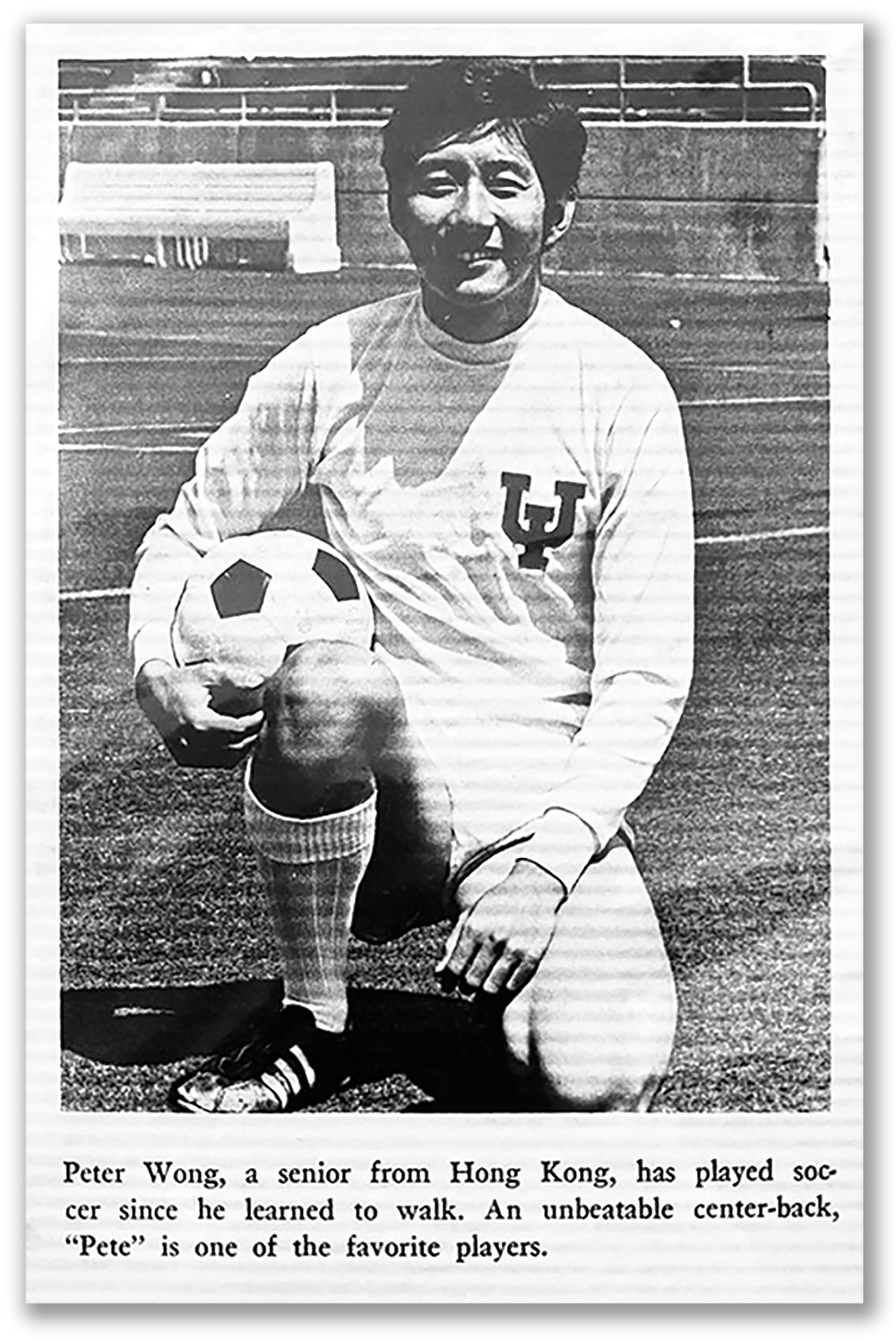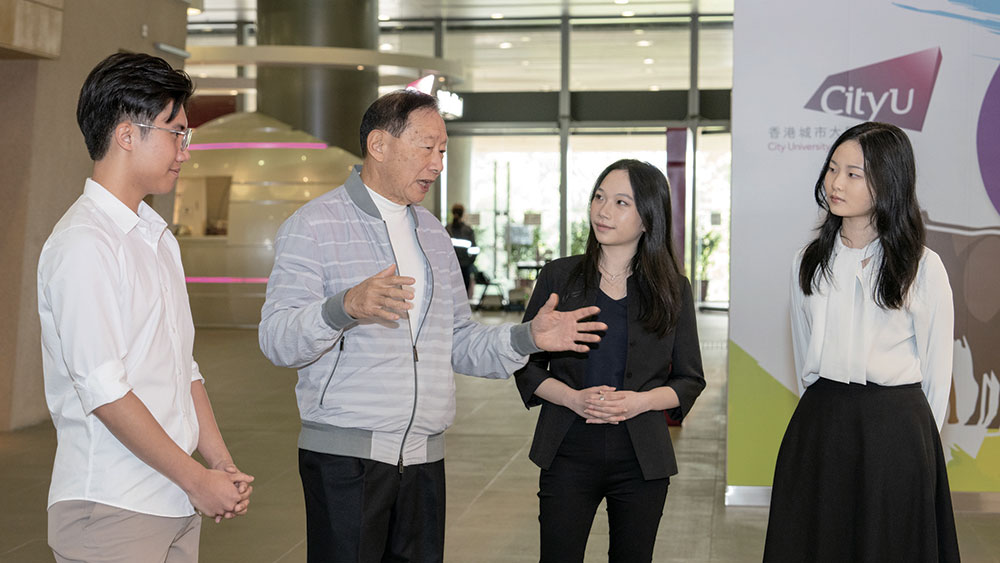Dr Peter Wong, Chairman, The Hongkong and Shanghai Banking Corporation Limited, and Chairman, the College
International Advisory Board (CIAB) of the College of Business, talks about the role of networking, internationalisation,
diversity, innovation, and the qualities he looks for in potential employees.
EC: We can all see that the world is changing really
fast right now.
PW: The world is very uncertain. With generative AI,
quantum computing, everything is going to go faster
and faster. How can we help the students to look at the
world and be able to understand? When they have the
knowledge to understand, it becomes a little bit more
logical and less frustrating.
EC: As part of that, how important is international
experience for our students in Hong Kong?
PW: It's great if you can travel around and go to different
places. But in the absence of that, when you're in a university environment what do you do? How do you
get the international knowledge? So, in the university,
first of all we must have diversity, inclusion. Different
races of people from different parts of the world. Try
to understand them, try to understand their culture, be
able to connect with them. How do they do business in
their countries? Also, without reading the international
news, you won't be able to connect the dots.
Networking and collegiate culture
EC: Is collegiate culture still important in this day
and age?
PW: The connectivity between students in forming a
network is very important. Today when I look at my customers, many of them are already well connected
with each other because they went to the same school or
universities overseas, and then they come back and have
a network. It's not like excellent academic achievement to
success. You need a lot of connections. When you have
friends in different industries you can talk to them and
say, OK, how does technology affect your field?
"Different people
from different cultures
look at problems
differently"
EC: Technology is that generic these days.
PW: The vocabulary in the general conversation with the
customers has changed. Previously it would just be like,
oh, yeah, how much are you exporting? Now, it's getting
to how does technology affect my work? And how does
ESG affect my work? Because I need to go to net zero
let's say by 2050. So how can I prepare myself for that?
Making ESG operational
EC: Do you see it as a positive development that there's
a sort of consensus around matters such as ESG?
PW: I think that there is a consensus around it, and
right now a lot of people are talking about it at a very
high level. But how does it impact the customers at the
operating level? I've talked to a lot of customers and
many of them don't understand the word net zero.
How do they get their manufacturing facilities from
where they are now to net zero? When I listen to my
customers saying that I see three opportunities. The first
one is that the banks can partner with companies that
are very knowledgeable in that industry and start the
target company on the journey to net zero. Secondly,
once the target company gets the idea of how to do
it, then they will invest. They'll buy equipment, they'll
build infrastructure and so forth. And so the banks
would come in and they can do fundraising for the
company. And then the third piece is that along the way
from where they are now to net zero, they have the
opportunity for carbon credit trading. There's another
big market for that. That market is being built right now, but it doesn't have any standards across the world.
So, these are the things that are coming and students
need to understand these trends. It is not enough just
to study. When we talk about ESG globally, the world
of Cop 28 and so forth, the idea is there, but the most
important thing is at the operating level.
Hong Kong's pivotal position
EC: Do you see Hong Kong still in a pivotal
position for transmitting, not just finance, but
ideas between East and West?
PW: Hong Kong, when I looked at the history, and I've
been in banking for 42 years now, in those years I've
gone through 12 crises. May it be pandemic. May it be
caused by politics, or may it be economics. But every
time Hong Kong bounced back very strongly. And if
you look at the housing prices, between 2008 to 2016
prices probably went up three times. To a certain extent,
I think this is the resilience of Hong Kong. The people
of Hong Kong know how to navigate. But also Hong
Kong's success is very closely related to China's success.
If you look at the GDPs of China and Hong Kong, it's
very much correlated. Hong Kong can only be of value
to China if Hong Kong is in the international space,
bringing all the best products, services and practices.
And then China can use Hong Kong as a pilot or a
gateway to understand the world.
"What made America
strong? It's like the
United Nations. You've
got students from all
over the world"
Getting to America
EC: I understand you didn't come from a privileged
background in Hong Kong?
PW: My father came to Hong Kong in 1948, basically
without a penny. He was well-to-do in Shanghai, lost
everything, came to Hong Kong and then started to
build himself again in the garment industry. When I look
at the way he budgeted for the family, the first thing
was where we lived. Of course, then the food. And the third thing was always about education. So, he worked
very hard to make sure that my brothers and sisters got
a proper education. And at that time, I went to Canada
when I was form 4 in Hong Kong.
EC: Why did you choose to study abroad?
PW: Because they wanted me to have an education, and
to see the world. So, I thought that Canada was very
appealing. And my father said, "OK, you learn English
because it's going to be important. It's an international
language and you see the world." I was in a boarding
school and what helped me the most was playing
sports. Then I went to the States, Indiana University. I
was recruited as a varsity player representing the school.
Again, that was a big deal because sport in the US is very
important. We got to travel around the country, play
against competition and that helped me a lot in terms of
integrating into a community, having a lot of friends just
by being part of the team. That's the collegiate part, not
just in terms of academics, but in terms of friendship.
"University is a place
where you can make
mistakes and you'll be
OK. You can explore
anything you want"
From collegiate to corporate
EC: So, if you like, the bottom line in education is
your grades. And if we now talk about corporate
culture, bottom line is how well you can deliver
certain tasks. But is there a carryover from the
collegiate thing?
PW: Yes, definitely. The carryover is how you
collaborate. How you can manage a team in a
company. In HSBC we have so many countries around
the world. In Asia, we at present have 17 countries.
How do you connect the businesses in those
countries? There are three types of flow in these
‘business corridors': the trade flow, the investment
flow and the private wealth flow. These corridors
connect the two countries. So how do you capitalise
on those?
EC: You see the bank as the vehicle for supporting
something which is quite broad based and quite
cultural?
PW: Exactly because if you don't have that mentality,
you're always by yourself and you don't think about collaboration. If you want to be a leader, you
must have a very open mind. About people, about
business, about change. You can't say, "that person
is smarter than me and therefore I don't want him
because one day he may want to take over by my
position." That's a very wrong concept.
Banking as a human endeavour
EC: So, communication is really the essence?
PW: Communication, collaboration, to make sure
people talk to each other. But also, the important
thing is that you yourself need to have a view about
the world. You need to think about what is good for
the company, not for yourself. If something is good
for the company, then it's also good for the staff
because as a leader you're not just accountable to
the company, you're also accountable to the staff
that work for you.
EC: So banks can be the vehicle for communication
between cultures?
PW: Absolutely and let's say the bank does well, it's
also good for society. Because we have, for example,
The Hongkong Bank Foundation where HSBC
donates to society and we look at the areas where
we want to focus, for example, the elderly during
Covid. Then the other focus that we have is the
youth programme. My philosophy about youth is that
we need to be active participators. It's not just about
donating to scholarships, it's active participation.
You know, for example we host the business case
competition.
Creating common values
EC: Is the younger generation working as efficiently
as you would like in a corporate setting?
PW: The younger generation today has access to
a lot more information than we had in my day. I
think the key challenge for them is to find out what
information is true, what information is not true,
and also, how do they utilise that information?
There should be some proper value guidance behind
that. If you want to lead, you need the followers
to see your values. You can't just say, well, I'm the
leader, and I've got money. That's not good enough.
You need to see the values behind. If you look at
Bill Gates, there's tons of money going into charity
donations for certain causes. If people have a much
bigger way of looking at the world, others will
follow them.
EC: Leadership again is actually about a
collectivity, and it's about bringing people
together culturally and creating common values?
PW: Creating common values, you've got to have
a vision that they would like to follow. One of the things that computer science taught me is artificial
intelligence. AI is always like from one state, you get
more information, you become another state. So, the
key is what is the next state? But that would be based
on the fact that you understand and you go out and
talk to different people, again the network, about where
do they think things are going. University is a very good
place for that because when you look at the various
innovations in the universities, autonomous driving,
pharmaceuticals, linguistics, and so forth, you get an
idea of where things are going.
EC: Many of our graduates will be ambitious to
join companies like HSBC. What qualities are you
looking for in potential employees?
PW: I want them to be international. Hard working is
a given. I want them to have an exploring mindset. It
cannot just be Hong Kong. They've got to be trained in
terms of how they look at things in a very objective and
not emotional way. Once you look at things objectively,
you make much better judgment.
"Hong Kong flourishes
because of the fact that
we have international
communities"
Expanding minds
EC: You use two concepts there — training on the one side and exploring mindset on the other. Do
you still see a place for the exploring mindset at
university?
PW: Yes, of course. Absolutely. University is a place where
you can make mistakes and you'll be OK. And that's
where you can explore anything you want, as long as you
have that mindset. When you're out of university, into
the workplace at the beginning you can still make some
mistakes, but as you continue to age and get experience
you shouldn't be making a lot of mistakes. Because when
you make mistakes somebody else could get hurt. So, in a
university, that's where you want to explore I would say.
Diversity and innovation
EC: Would you like to see greater diversity in
Hong Kong education?
PW: Yes, of course, because that's where you get the
different cultures. What made America strong? To a
certain extent, it's like after the Second World War they
got all the German scientists to go over. And then the
disintegration of the Soviet Union, they've again got
some of the scientists. And they create a good university
environment, it's like the United Nations; you've got
students from all over the world. They've got well known
universities, they've got the best and the brightest to go to
their universities and when these people come together,
their minds and everything is limitless. And that's where
your talent pool is. It's not just one place. The talent pool is
coming from all over the world. If you look at all the Nobel
Prize winners in the United States, are they all Americans?
No. They're from all over, but they work in America.
EC: Are diverse environments almost a
prerequisite for a truly innovative society?
PW: Yes, I think that's key. Different people from different
cultures, they look at problems differently. Even the problems in their home countries are very different. It
requires different ways to solve them. The network effect
is very important. Because when you have different
people thinking about different things and you pull them
together laterally, have an integration across them, there
are a lot more things coming out from that. It's limitless.
It's just that we need to get the students to think like that,
to have an expanding mind.
An open-ended conversation
EC: So, in fact, we need an open-ended
conversation...
PW: Open-ended conversations, and let them understand
what's happening in the world. Previously, if you look at
China, you won't hear China having a lot of conversations
with the Middle East. Now you do. Every day, Middle
Eastern people are coming, like from Saudi Arabia, the oil,
the investments. So new things are developing all the time
and the students need to understand.
EC: So as an end note, Hong Kong will continue to
be a place where conversations between East and
West can happen in the future?
PW: Yes, that's something that we must do, we must
achieve. Hong Kong is an international centre. Hong Kong
flourishes because of the fact that we have international
communities; we have French, Bristish, Canadians,
Indians, so forth. All these conversations that are taking
place are enhancing Hong Kong as an international
centre. Conversation needs to be all over the world. The
US, Europe, Middle East, South Asia, and countries that
are up and coming.
A longer version of this interview is available in the online
magazine.
https://www.cb.cityu.edu.hk/CBMagazine/Issue18/Expanding-networks-and-minds





